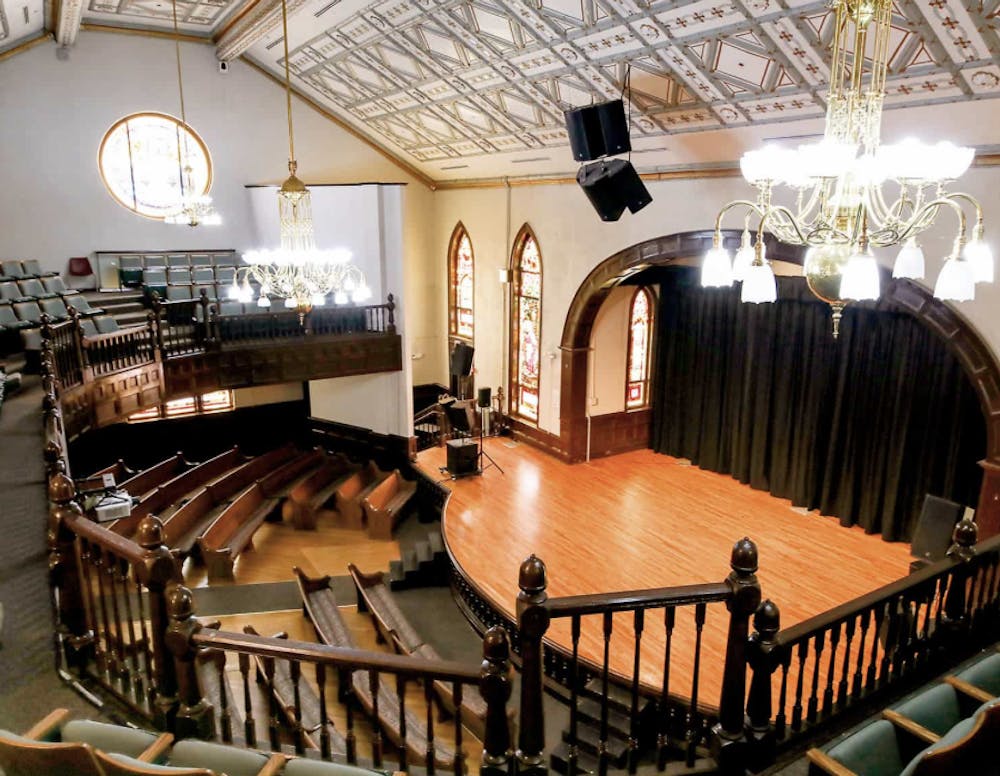On April 17 at the Hayti Heritage Center, seven slam poets competed for a coveted spot on the 2021 Bull City Slam Team. These poets are a part of the 16 year legacy of the “Triangle’s longest running poetry event” — the Jambalaya Soul Slam. Since 2005, poets have competed monthly. 12 slam poets, 18 years of age or older, can participate in these monthly slams. Some slams have specific themes, including an erotic poetry slam this February. The 12 winning poets faced-off in the April Grand Slam Finals. The top four poets — Grand Slam Champion and the next three highest-scoring — form the BCST for that year. The BCST goes on to compete in the Southern Fried regional slam poetry competition each June.
To get a real sense of what the Jambalaya Soul Slam is all about, you have to experience it for yourself. The physical space is well suited to amplify sound. Most of the poets didn’t even need a microphone for their voices to be heard. Projection coupled with echo made it feel like their poetry was literally slamming into me. The event was immersive and intimate, like the space was inviting us to sit quietly and absorb the words.
Nine poets performed on Saturday night. The first, Khalisa Rae, was the night’s featured poet. She read a sample of poetry from her new book, “Ghost in a Black Girl’s Throat.” The first poem she read, “Full Moon to Monday,” talked about sexual assault, a recurring theme throughout the night. It ended by referring to the narrator’s need to be ready for an exam on Monday morning. While I thankfully have never experienced anything that traumatic, I understand the surreality of setting aside all your real problems in favor of schoolwork.
After Khalisa’s performance, the slam’s MC Dasan acted as the “sacrificial poet” — essentially a practice performance for the benefit of the judges, who were audience volunteers. Finally, the actual competition began. The slam was made up of three rounds: seven poets performed in the first, then six, then four. After each of the seven poets performances, the judges would hold up chalk paddles with their scores from 0.0 to 10.0. The rest of the audience would boo if they thought the judges were too harsh and cheer if they agreed with the decisions. During the performances, the audience showed its support by humming, stomping feet or snapping. Every poet had their own style of delivery. One woman alternated between speaking and singing. LB, who placed in second, centered each of his three poems in a different metaphor — music, an infomercial and a white man talking to a black man about the latter’s place in the South. Four amazing poets by the names of Ta’Mia, LB, Hausson and Alani prevailed and are this year’s BCST.
Most of the poems were related to violence towards black people, especially black men and boys. It was humbling to sit there and listen to that unfettered emotion. Often, the emotion behind the words was the only thing I could really grasp since the speed and complexity of the poetry sometimes kept me from understanding the words themselves. Yet the emotion was always clear. That being said, I wouldn’t say I understood the specific anger and sadness and pain that the poets described; those feelings are connected to things I will never experience firsthand. Still, I was grateful for the chance to listen.
At the beginning of the night, Dasan talked about how poetry can create safe spaces and opportunities for healing. Many of the poets talked about personal experiences and were incredibly vulnerable through their art. I recognize that it was a privilege for me to hear their stories, and I recognize that those stories are not mine to tell.
Get The Chronicle straight to your inbox
Sign up for our weekly newsletter. Cancel at any time.

